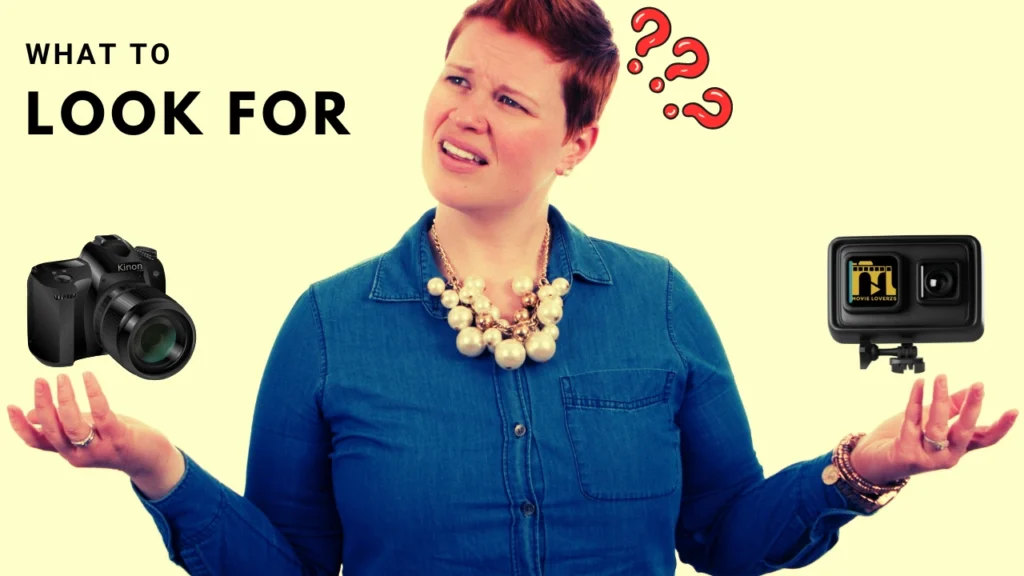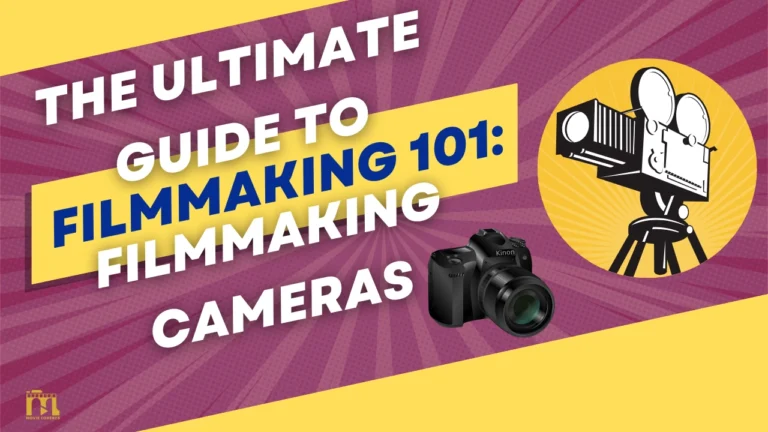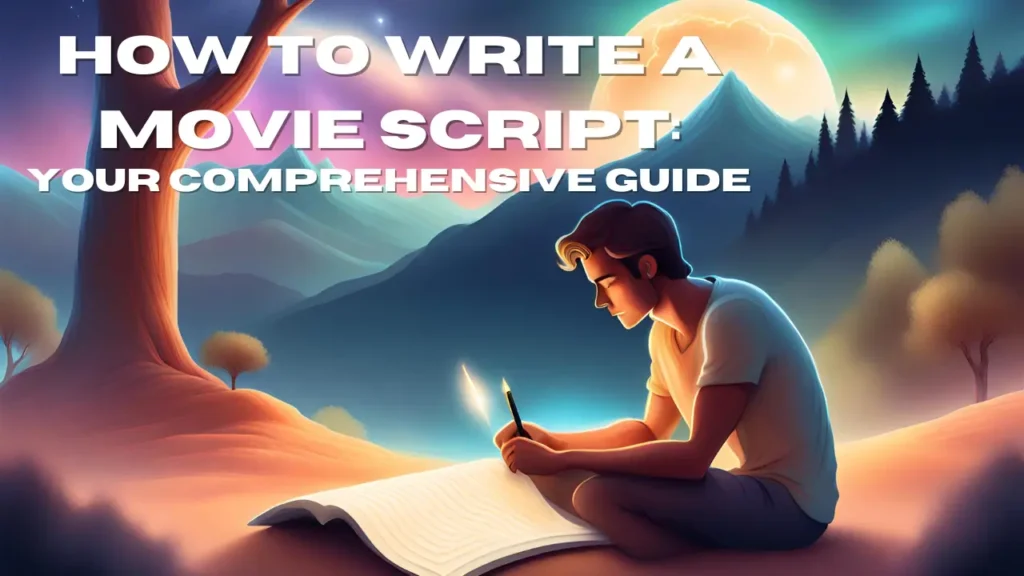Table of Contents
ToggleWhen it comes to filmmaking, having the right camera is crucial. A good camera can make all the difference in the world when it comes to the quality of your film.
With so many cameras on the market, it can be overwhelming to choose the right one for your needs.
Hey there! If you’re interested in learning about the ins and outs of filming, you should definitely check out “The Art of Cinematography.” It’s a great guide that covers everything from camera angles to lighting and more. It’s a comprehensive resource for anyone looking to get into the world of cinematography!
In this guide, we’ll explore the different types of cameras available and what to look for when making your decision.
Types of Cameras

DSLR Cameras
DSLR cameras are a popular choice among filmmakers due to their versatility and affordability. They have a large image sensor, which allows for high-quality video and the ability to change lenses.
DSLRs can also shoot in low light and can produce a shallow depth of field, which is great for cinematic shots.
Mirrorless Cameras
Mirrorless cameras are similar to DSLRs but are smaller and lighter in weight. They also have a large image sensor and the ability to change lenses.
Mirrorless cameras offer high-quality video and can shoot in low light, making them a great choice for filmmakers.
Cinema Cameras
Cinema cameras are designed specifically for filmmaking and are used by professionals. They offer high-quality video, advanced features, and the ability to shoot in RAW format.
Cinema cameras are also very expensive, making them out of reach for many independent filmmakers.
Action Cameras
Action cameras are small, portable, and designed for capturing action shots. They are great for filming sports and outdoor activities and can be mounted to a helmet, bike, or other equipment.
While action cameras may not be ideal for traditional filmmaking, they can be used to capture unique perspectives and add variety to your footage.
What to Look For
When choosing a camera for filmmaking, there are several factors to consider.

Here are some of the most important things to look for:
Budget
The first thing to consider is your budget. Filmmaking cameras range from a few hundred dollars to tens of thousands of dollars.
It’s important to determine your budget before you start shopping for a camera, as this will help narrow down your options.
Image Quality
Image quality is perhaps the most important factor to consider when choosing a camera. Look for a camera with a high-resolution sensor and the ability to shoot in RAW format. This will give you the most flexibility when editing your footage.
Low-Light Performance
Filmmaking often takes place in low-light conditions, so it’s important to choose a camera that can handle these situations. Look for a camera with a large image sensor and a low aperture lens.
This will allow for more light to enter the camera and produce clearer footage in low-light conditions.
Resolution
The resolution of a camera determines the quality of the image. The higher the resolution, the sharper and more detailed the image will be. It’s important to consider the resolution you need for your project.
For example, if you’re shooting for the big screen, you’ll need a camera with a high resolution to ensure your footage looks great when projected.
Sensor Size
The sensor size of a camera determines the depth of field and low-light performance. A larger sensor size will produce a shallower depth of field and better low-light performance.
It’s important to consider the sensor size you need for your project.
For example, if you’re shooting a scene with low light, you’ll need a camera with a larger sensor size to ensure you can capture the scene effectively.
Frame Rate
The frame rate of a camera determines how many frames per second the camera can capture. This affects the smoothness of the footage.
A higher frame rate will produce smoother footage, while a lower frame rate will produce more choppy footage. It’s important to consider the frame rate you need for your project.
For example, if you’re shooting a fast-paced action scene, you’ll need a camera with a high frame rate to capture the action smoothly.
Audio Quality
Good audio is just as important as good video when it comes to filmmaking. Look for a camera with a built-in microphone or the ability to connect an external microphone. This will allow you to capture high-quality audio to accompany your video.
Lens Compatibility
Being able to change lenses is important for achieving different looks and styles in your footage. Look for a camera with a variety of lens options available, and make sure the lenses you’re interested in are compatible with the camera you choose.
Stabilization
Shaky footage can be distracting and take away from the overall quality of your film. Look for a camera with built-in stabilization or the ability to use a stabilizing device.
This will help produce smoother footage and make your film more professional-looking.
Choosing the Right Filmmaking Camera for Your Project
Now that you know what to consider when choosing a camera and the different types of cameras available, it’s time to choose the right camera for your project.

It can be a daunting task, but with the right information and guidance, you can make the best decision for your needs.
Consider Your Project’s Needs
The first step in choosing the right camera is to consider your project’s needs. Think about the type of project you’re working on and what you need the camera to do.
Consider the environment you’ll be shooting in, the lighting conditions, and the type of shots you’ll be capturing.
Think About Your Budget
As mentioned earlier, your budget will significantly affect the type of camera you can afford. Determine how much you’re willing to spend and stick to it.
Keep in mind that there are many great cameras available at different price points, so don’t feel like you need to spend a fortune to get a great camera.
Do Your Research
Once you’ve determined your project’s needs and your budget, it’s time to start researching cameras.
Read reviews, watch video demonstrations, and talk to other filmmakers to get their recommendations. Take your time to ensure you’re making an informed decision.
Rent Before You Buy
If you’re unsure which camera to choose, consider renting several different cameras before making a final decision. This will allow you to test out different cameras and determine which one works best for your project.
Tips for Using Your Filmmaking Camera
Once you’ve chosen the right camera for your project, it’s time to start using it.
Here are some tips for getting the most out of your filmmaking camera:
Shoot in Manual Mode
Manual mode gives you complete control over the camera’s settings, allowing you to create the look you want for your footage.
Use a Tripod
A tripod will help you stabilize your shots and create a more professional look for your footage.
Experiment with Different Lenses
Different lenses can create vastly different looks for your footage. Experiment with different lenses to find the perfect look for your project.
Shoot in RAW
Shooting in RAW will give you more flexibility when it comes to editing your footage.
FAQs
What’s the best camera for filmmaking?
The best camera for filmmaking will depend on your project’s needs and your budget. Do your research and consider the factors mentioned in this article to make an informed decision.
Can I use a DSLR camera for filmmaking?
Yes, many filmmakers use DSLR cameras for their projects. They are affordable and versatile, but may not have all the features and capabilities of more specialized cameras.
What’s the difference between a DSLR and a mirrorless camera?
The main difference is that a DSLR uses a mirror to reflect light into the viewfinder, while a mirrorless camera uses an electronic viewfinder or the camera’s screen to display the image. Mirrorless cameras tend to be smaller and lighter but may have a shorter battery life.
Should I shoot in manual mode or automatic mode?
Shooting in manual mode gives you more control over the camera’s settings and allows you to create a specific look for your footage. However, the automatic mode can be useful in certain situations, such as when you need to quickly adjust to changing lighting conditions.
What’s the best lens for filmmaking?
The best lens for filmmaking will depend on your project’s needs and the look you want to achieve. Consider factors such as focal length, aperture, and image stabilization when choosing a lens.
Conclusion
Choosing the right camera for filmmaking is an important decision. Consider your budget, the type of films you want to make, and the factors listed above when making your decision.
With the right camera, you’ll be able to produce high-quality, professional-looking films that will captivate your audience.






